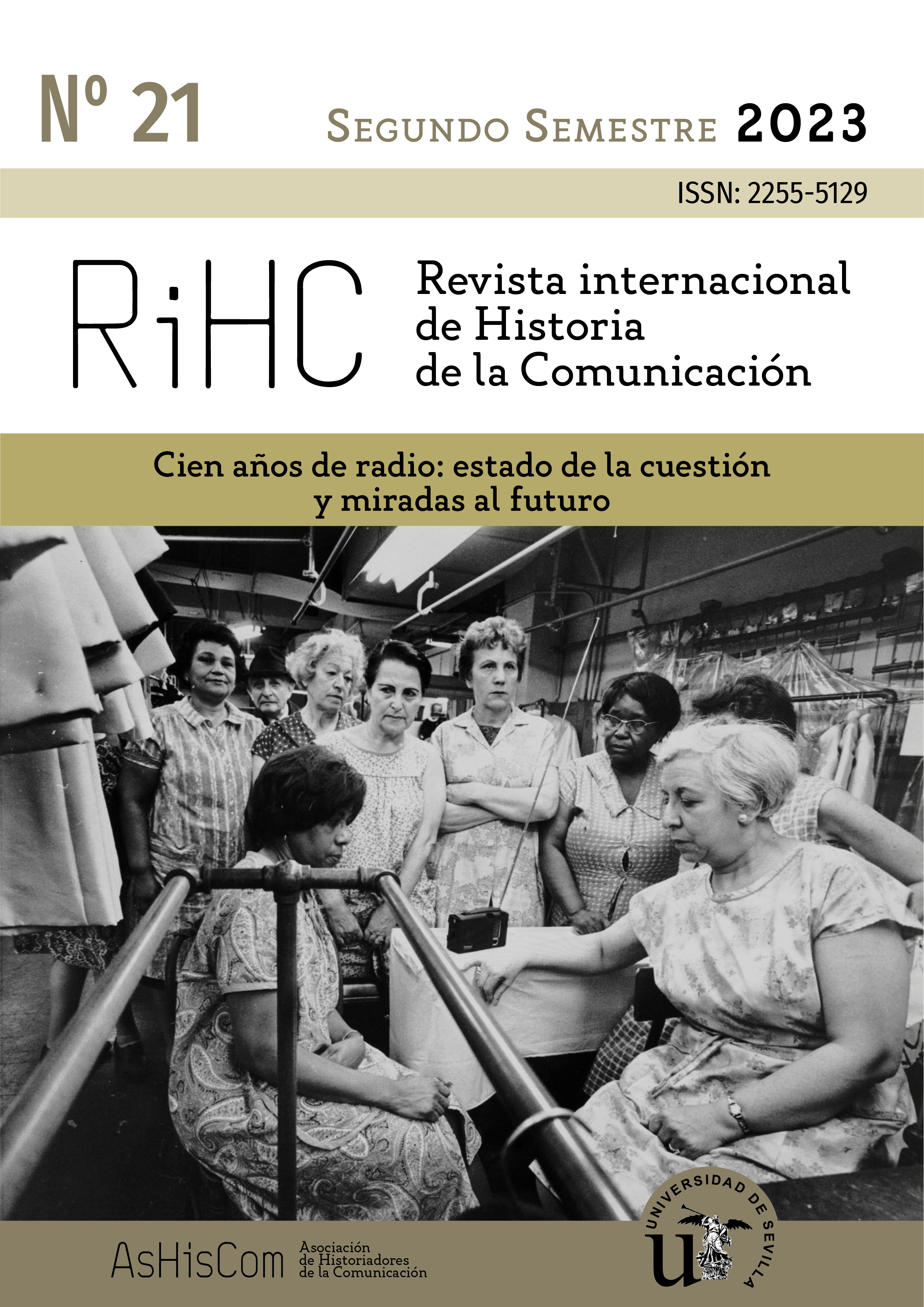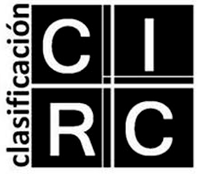Literature on Franco’s television: literary adaptations and the promotion of reading in franco’s programming (1958-1975)
DOI:
https://doi.org/10.12795/RIHC.2023.i21.10Keywords:
Programming, TVE, Literature, Divulgation Programms, Theatral emissionsAbstract
The aim is to assess the extent to which literature was present in TVE’s programming during the Franco era. To this end, the presence of literature in the programmes broadcast between 1 January 1958 and 20 November 1975 will be examined. Two types of programmes will be analysed: on the one hand, cultural programmes, which were aimed at disseminating literary novelties and promoting reading among viewers; and, on the other hand, adaptations or representations of literary works. In the first case, an exhaustive approach will be made by analysing the contents of each programme. As for the programmes that turned literary classics into television entertainment, a study will be made of them from the point of view of programming, focusing on the time of day they were scheduled, the audience they were aimed at and their real weight in the grills. The main conclusion of this analysis is that literature was one of the pillars of cultural dissemination.
Downloads
References
Consulta de recursos en hemeroteca
Telediario: Programa semanal de la TVE (1957-1959)
Tele Radio (1960-1975)
ABC
La Vanguardia
Archivos físicos
Archivo General de la Administración. Paseo de Aguadores, 2. Alcalá de Henares, Madrid.
Fondo Documental de RTVE. Prado del Rey. Pozuelo de Alarcón, Madrid.
Referencias bibliográficas
ANTONA JIMENO, T. (2014): «Lo orígenes de la televisión educativa en TVE (1958-66)» en Estudios sobre el Mensaje Periodístico, vol. 20, nº Especial, pp. 209-226.
— (2016): “La programación televisiva del tardofranquismo: la propaganda en las emisiones de entretenimiento y divulgación”, en Comunicación y medios, nº34, pp. 8-21.
ANTONA JIMENO, T., y MARTÍN-QUEVEDO, J. (2021): “Doctrina catódica. Las asignaturas de Religión y Formación del Espíritu Nacional en la televisión franquista (1958-1975)”, en Estudios sobre el Mensaje Periodístico, vol. 27, nº 3, pp. 753-764.
CORNER, J. (1999): Critical ideas in television studies, Oxford University Press.
CORTES, J. Á. (1998): La programación en la neo televisión, tesis doctoral, Madrid, Universidad Complutense de Madrid.
DIEGO, P. (2010): La ficción en la pequeña pantalla. Cincuenta años de series en España, Eunsa.
FISKE, J. y HARTLEY, J. (1978): Reading television, Routledge
LÓPEZ MELGAREJO, A. M. (2019). La Junta Nacional contra el analfabetismo (1950-1970): un análisis documental. Educatio Siglo XXI, 37(2 Jul-Oct), 267–286.
MARTÍN QUEVEDO, J. (2015): La programación de la Segunda Cadena de TVE durante el franquismo (1966-1975), tesis doctoral inédita, Madrid, Universidad Complutense de Madrid.
MARTÍN QUEVEDO, J. y FERNÁNDEZ RAMÍREZ, L. (2020): “Una propuesta metodológica para el análisis histórico de la programación en televisión. El ejemplo de la Segunda Cadena de TVE (1966-1975)” en Revista Espacios, vol. 41, nº 12.
MARTÍN-QUEVEDO, J., NAVARRO-SIERRA, N. y GÓMEZ-RODRÍGUEZ, G.-M. (2021): “Orígenes y desarrollo de las televisiones culturales en Europa. Una comparación entre la Segunda Cadena de TVE, BBC-2 y RTP-2 (1966-1975)” en Memoria y Civilización, vol. 240, pp. 591-615.
MONTERO, J. y PAZ, M. A. (2014): «Lo barroco en la televisión franquista: tipos y temas; actores y escenarios», en Bulletin of Spanish Studies: Hispanic Studies and Researches on Spain, Portugal and Latin America, vol. 91 nº5, pp. 773-792.
MONTERO, J. (2014): “Programación y programas de televisión en España antes de la desregularización (1956-1990): Introducción al monográfico”, en Estudios sobre el mensaje periodístico, vol. 20, nº especial, pp. 11-24.
— (Ed.) (2018): Una televisión con dos cadenas. La programación en España (1956-1990), Madrid, Cátedra.
MONTERO, J., PAZ, M. A. y LACALLE, C. (Eds.) (2022): La edad dorada de la televisión generalista en España (1990-2010). Programas y programaciones, Valencia, Tirant lo Blanch.
PALACIO, M. (2001): Historia de la televisión en España, Madrid, Gedisa.
PAZ, M. A. y MARTÍNEZ, L. (2014a): “Children’s programming on Televisión Española under Franco (1958–1975)”, en European Journal of Communication, vol. 29, nº4, pp. 465-479.
— (2014b): «La primera conformación de una audiencia infantil y juvenil para la televisión en España (1958¬1968)», en Estudios sobre el Mensaje Periodístico, vol. 20, nº Especial, pp. 43-58.
RODRÍGUEZ MERCHÁN, E. (2014): «Antecedentes, orígenes y evolución de un programa mítico: Estudio 1 de TVE», en Estudios sobre el Mensaje Periodístico, vol. 20, nº Especial, pp. 267-279.
RODRÍGUEZ PASTORIZA, F. (2007): La literatura y el pensamiento en los programas culturales de la televisión en España durante la transición en Literatura y medios de comunicación de masas en la transición (1973-1982), Universidad de Zaragoza, pp. 25-51.
VICENT IBÁÑEZ, M. (2023) La programación de Canal Plus España (1990-2005): historia de la primera televisión de pago en España a través de sus contenidos, tesis doctoral inédita, Madrid, Universidad Complutense de Madrid.
VIÑAO, A. (2009): La alfabetización en España: un proceso cambiante de un mundo multiforme en ORENO MARÍNEZ, P.L. y NAVARRO GARCÍA, C. (Coords.), Perspectivas históricas de la educación de personas adultas, Vol 3, Nº1, Universidad de Salamanca, pp. 5-19.
WILLIAMS, Raymond (2003): Televisión: technology and cultural form,New York, Routledge (1ª edición 1973).
Downloads
Published
How to Cite
Issue
Section
License
Copyright (c) 2023 RIHC. Revista Internacional de Historia de la Comunicación

This work is licensed under a Creative Commons Attribution-NonCommercial-ShareAlike 4.0 International License.
RiHC. Revista internacional de Historia de la Comunicación is an open access publication, offering its content under the principle that making research available to the public free of charge contributes to the greater exchange of global knowledge.
RiHC. Revista internacional de Historia de la Comunicación adheres to the various initiatives that promote access to knowledge. All content is therefore free of charge and is published under the Creative Commons Attribution-NonCommercial-ShareAlike 4.0 International license.
By virtue of this, the authors who publish in this journal accept the following conditions:
- Open access content may be freely shared (that is, copied and redistributed in any medium or format) and adapted (remixed, transformed and built upon).
- Attribution: The user of the content must give appropriate credit, provide a link to the license, and indicate if changes were made. This may be done in any reasonable manner, but not in any way that suggests the licensor endorses the user or their use.
- Non Commercial: The content may not be used for any commercial purpose.
- Share Alike: If the content is remixed, transformed or built upon, it must be distributed under the same licence as the original.
- No additional restrictions: No legal terms or technological measures may be applied that legally restrict others from doing anything the licence permits.














